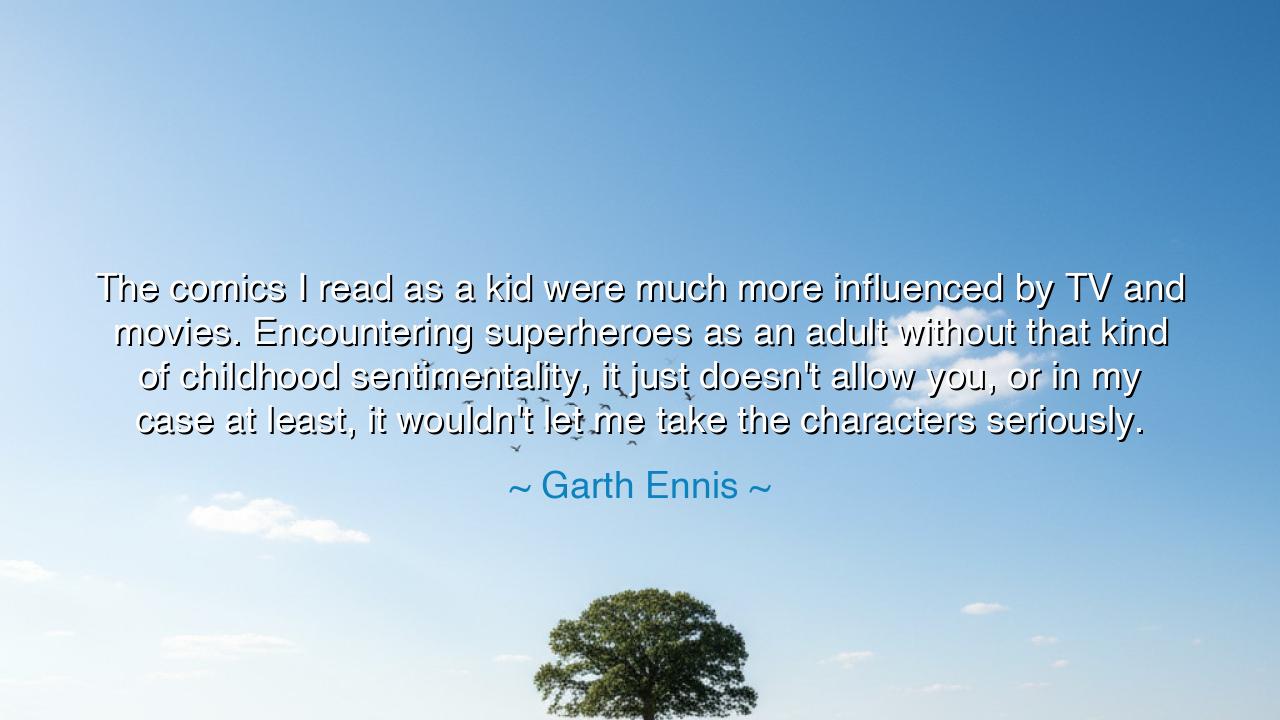
The comics I read as a kid were much more influenced by TV and
The comics I read as a kid were much more influenced by TV and movies. Encountering superheroes as an adult without that kind of childhood sentimentality, it just doesn't allow you, or in my case at least, it wouldn't let me take the characters seriously.






Gather close, children of the future, for the words of those who understand the nature of storytelling and the power of memory often carry deeper truths about how we perceive the world. Garth Ennis, a creator whose works have touched the hearts of many, once shared a thought that speaks not only to the world of comics but to the very nature of nostalgia and growth. He said: "The comics I read as a kid were much more influenced by TV and movies. Encountering superheroes as an adult without that kind of childhood sentimentality, it just doesn't allow you, or in my case at least, it wouldn't let me take the characters seriously." These words reflect an emotional truth about the role of childhood experiences in shaping our adult perceptions and the power of sentimentality in how we approach the things we love.
In the ancient world, the stories of gods, heroes, and mythical creatures were often told through the lens of personal connection—not just because of their inherent grandeur, but because they were seen through the eyes of the people. The epic poems of the Greeks, like Homer's Iliad and Odyssey, were not merely stories of distant, unreachable gods and men, but were deeply connected to the values and emotions of the society that embraced them. A young child raised in the shadow of these myths would grow up with a deep attachment to the heroes and gods, seeing them as symbols of strength, wisdom, and the human condition. But as one matured, their view of these stories often shifted. What once inspired awe could sometimes turn to irony or distance, as adulthood brought a more pragmatic understanding of the world. Ennis’s words echo this transformation—what once was viewed with innocence and sentimentality can be seen with a more critical eye as we grow older.
Consider the story of King Arthur and his Knights of the Round Table. As a child, one might see Arthur as the ultimate hero, the noble king who defends the realm and upholds justice. His excalibur, his bravery, his sacrifice would seem to hold an almost mythical, unchallengeable power. Yet, as one matures, there may be a shift in how we view Arthur’s leadership—the flaws in his character, the betrayals that led to the fall of Camelot, the complexities of loyalty and honor. The childhood connection to the stories of Arthur might not allow for these darker, more complicated aspects to emerge, but as one grows and becomes aware of the complexities of the world, the very same story may no longer evoke the same admiration. Ennis’s experience with superheroes, and his acknowledgement of sentimentality, reveals how the lens through which we view stories shifts as we grow, and how nostalgia can cloud our understanding.
The superheroes of comics, much like the gods and heroes of ancient myth, hold a certain power and grandeur when we are young. Characters like Superman, Batman, and Wonder Woman were once icons of justice and hope, their actions defined by the purity of their cause. But as we grow, and as we encounter these figures with more mature eyes, we begin to see the flaws and contradictions in their world. Just as the ancients began to view their gods as complex beings—capable of both great acts and great failings—so too do we see superheroes as products of their time, reflecting the values and imperfections of the world they are meant to represent. Ennis’s perspective captures this evolution: without the sentimental attachment of childhood, superheroes can seem increasingly unrealistic, even unrelatable.
This brings us to an important lesson about the nature of growth and change. Childhood is a time of innocence and idealization, when we view the world through the lens of hope and purity. The heroes of our youth—whether in comics, literature, or myth—serve as symbols of what we aspire to. Yet, as we grow and face the complexities of life, we must allow ourselves the freedom to see these heroes with clearer eyes, recognizing both their virtues and their flaws. Sentimentality may make it difficult to critique these figures, but it is in that critique, in the maturation of our understanding, that we can find deeper meaning.
Children, the real challenge of growing up is not just about the loss of innocence, but about the gain of wisdom. Just as Ennis no longer sees superheroes through the rose-colored glasses of childhood, so too must we look at the world around us with both hope and realism. Do not lose your sense of wonder, but do not let it cloud your ability to see the truth in the things that matter most. Life is not about clinging to the past but about integrating the lessons of the past into the reality of the present.
In your own lives, remember that heroes are not perfect. They are human, just like you. And growth means understanding that complexity—the understanding that things once viewed with innocence may, over time, reveal their imperfections. But that is not a loss. It is a gain, for it allows you to appreciate the depth and richness of the world, to embrace heroes for what they truly are: flawed, complex, and deeply human. In doing so, you can begin to see the true value of these figures—not as objects of mere admiration, but as reflections of your own journey.






AAdministratorAdministrator
Welcome, honored guests. Please leave a comment, we will respond soon